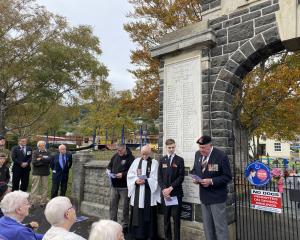Neighbours in the past often knew each other as a matter of course - across the back fence, in the street or through local organisations.
Steadily, for all sorts of reasons, local cohesion and local knowledge has diminished.
Busy parents are away all day, people are more mobile and suburban institutions such as Scouts, churches and even many local schools have weakened or disappeared.
Community is ever more likely to be based on interests rather than geography in cities like Dunedin.
Residents identify with others across town with whom they share a slice of their time, their hobbies, their sports.
Others, with a plethora of stay-at-home entertainment options, feel less need to be out and about.
Society is the weaker for all this because humans are social animals who thrive on belonging and on caring for each other.
We like congregating in small groups and sometimes, when motivation is right, in larger numbers as at concerts, sports events or Anzac commemorations.
Despite the trends, signs occasionally point to more rather than less community.
Neighbourhood Support groups, it has been reported, have doubled in number in Dunedin in the past year to 187.
They are, in a sense, an attempt to replicate what might have happened decades ago without the need for a structure.
Supported by the police, they can help reduce crime and, as Southern co-ordinator Sarah Hexamer-McNamara said, help reduce the fear of crime because people feel more connected.
They foster readiness to cope with emergencies and can promote everyday interaction and co-operation.
Such organisations, unfortunately, wax and wane all too easily. They, and similar groups, often begin with enthusiasm and the best of intentions only to tail off because of inertia and apathy.
Critical, therefore, are vigorous and persistent street co-ordinators, the types of people who might already be the backbone of clubs and other bodies because of their personality and their motivation. These people are to be treasured and should not be taken for granted.
They deserve recognition and thanks.
Other efforts warrant recognition too.
The Northeast Valley Transition Town group has been beavering away, with a focus on the valley and adjacent suburbs becoming more sustainable and resilient in the face of climate change.
Progress, inevitably, is slow and it is easy to scoff at efforts which would seem to make little difference in the face of vast global issues.
But praise is warranted for those battling away anyway, for their bringing of people together, for the starting of ideas like the community orchard on public land.
This endeavour again pushes against dominant and prevailing tides in society, and these are people with ideals who are willing to try to do something practical.
Once again, they are trying to capture something valuable from the past as well as looking to the future.
Western culture and urbanisation has bolstered individualism, a characteristic important in the modern world.
Individual rights underpin democracy, freedom and the economy and must not be scorned.
But no culture is, or should be, static and the West could benefit from more community at all levels.
Other cultures need to adapt to fit in with the modern world and, in turn, mainstream Western culture can gain from Asian, Pacific or Maori senses of community.
Individuals take their place in relationship with others, and these basic human needs should not be forgotten.
In our small province, it is quite likely that friends and pursuits are spread widely - but it remains in everyone's interest to retain links with their immediate neighbours.











